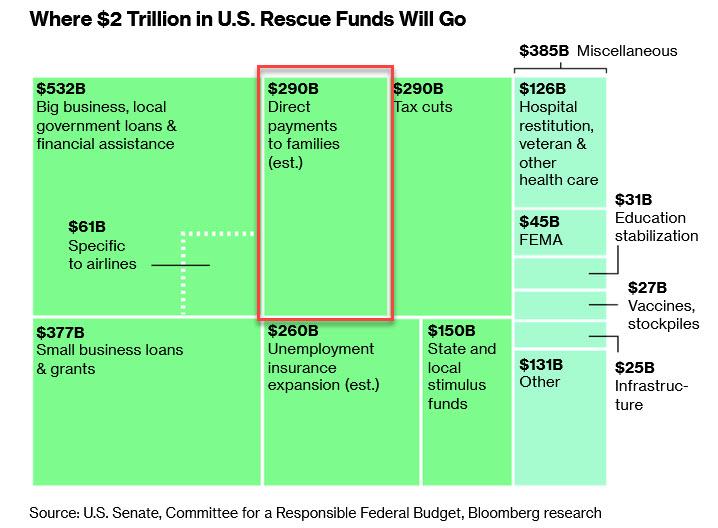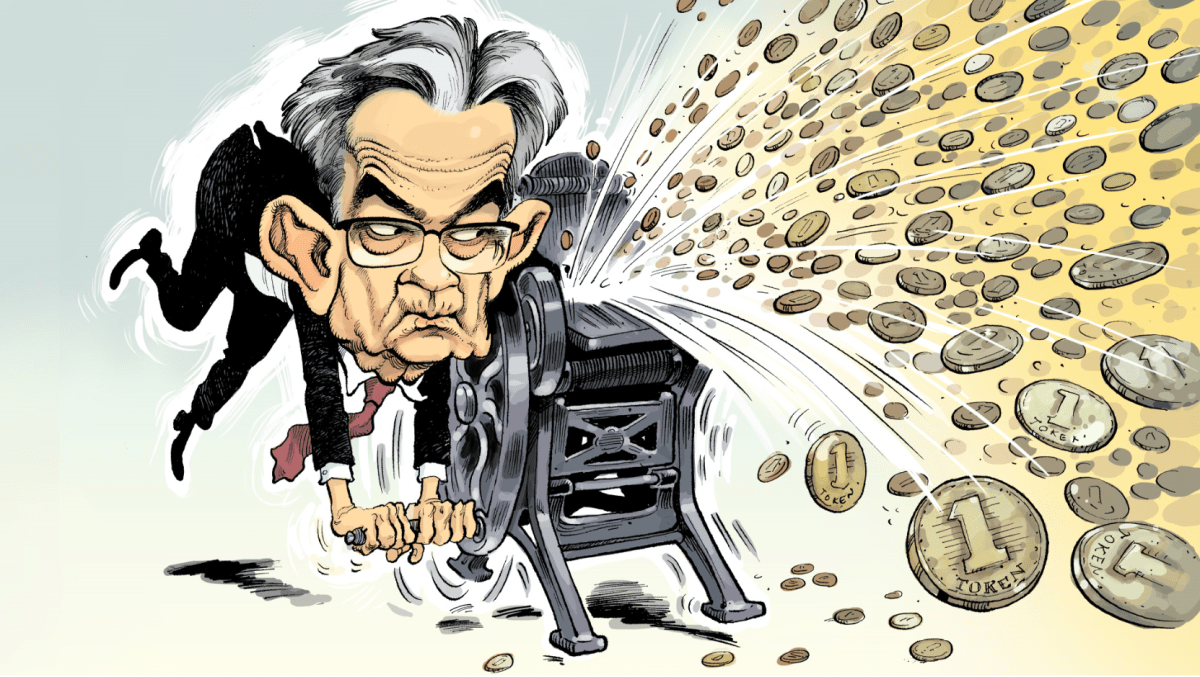"If Getting Us Into $6 Trillion More Debt Doesn’t Matter, Then Why Not $350 Trillion?"
Shortly after 4pm, president Trump signed into law the $2 trillion fiscal stimulus also known as the Coronavirus Aid, Relief, and Economic Security Act (CARES Act), which gives the Fed the ammunition to issue up to $4.5 trillion in additional debt, a "Multitrillion Dollar Helicopter Credit Drop" as Bloomberg called it, and officially launches not only helicopter money but the biggest wealth transfer in US history, as not only will the Fed balance sheet double on short notice but will unleash an unprecedented spending spree the likes of which not even Alexandra Ocasio-Cortez could have ever imagined would take place.
One person tried to if not stop it, then at least delay and ask the critical questions that everyone else in Congress should have been asking: why are US citizens, who are supposed to be the sole beneficiaries of this emergency bailout act, just a footnote in the gargantuan bill's deluge of electronic ones and zeroes. That person was Republican Rep. from Kentucky, Thomas Massie, who tried to force a recorded vote on the legislation, i.e., a roll coll, prompting a scramble by House members to come back to Washington to form the required quorum of at least 216 members.
Of course, Massie failed, as the vote passed and was eventually signed into law. However, Massie did at least try to bring some much needed attention to what was contained in the bill, and pose some of the key questions that so many others should have asked.
Below are some of his key points:
This bill should have been voted on much sooner in both the Senate and House and it shouldn’t be stuffed full of Nancy Pelosi’s pork- including $25 million for the Kennedy Center, grants for the National Endowment for the Humanities and Arts, and millions more other measures that have no direct relation to the Coronavirus Pandemic. That $25 million, for example, should go directly to purchasing test kits. The number one priority of this bill should have been to expand testing availability and creation of tests so that every American, not just the wealthy and privileged, have access to testing. We have shut down the world’s economy without adequate data. Everyone, even those with no symptoms, needs immediate access to a test.
Of course, to quote none other than Nancy, "we have to pass the bill to find out what's in it", and we are confident that in just a few months, everyone will find out precisely why the bill was so rushed: because out of the $2 trillion, only $290 billion is meant for direct payments to families, which as a reminder was the whole point of the bill.
Massie also pointed out that among the bill's key provisions was the even greater entrenchment of Fed secrecy, a Fed which in theory is there to serve the people yet which has successfully defended against an open audit for over a decade:
This bill creates even more secrecy around a Federal Reserve that still refuses to be audited. It allows the Federal Reserve to make decisions about who gets what, how much money we’ll print. With no transparency.
Massie was referring to the fact that the bill repeals the sunshine law for the Fed’s meetings until the end of the year, or until the President says the coronavirus threat is over, which may very well be never. That, as Wall Street on Parade notes, "could make any FOIA lawsuits to unleash details of what’s going on next to impossible since it has been codified in a federal law." The bill states the following:
SEC. 4009. TEMPORARY GOVERNMENT IN THE SUNSHINE ACT RELIEF. (a) IN GENERAL.—Except as provided in subsection 8 (b), notwithstanding any other provision of law, if the Chairman of the Board of Governors of the Federal Reserve System determines, in writing, that unusual and exigent circumstances exist, the Board may conduct meetings without regard to the requirements of section 552b of title 5, United States Code, during the period beginning on the date of enactment of this Act and ending on the earlier of— (1) the date on which the national emergency concerning the novel coronavirus disease (COVID–19) outbreak declared by the President on March 13, 2020 under the National Emergencies Act (50 20 U.S.C. 1601 et seq.) terminates; or (2) December 31, 2020.
This would also mean that US taxpayer will never learn why they went into debt to the tune of $454 billion, which would then be levered 10x by the Fed to issue up to $4.5 trillion in loans to companies the Fed deems appropriate, if no records are being maintained.
However, Massie's final point that was the punchline:
If getting us into $6 trillion more debt doesn’t matter, then why are we not getting $350 trillion more in debt so that we can give a check of $1 million to every person in the country?
Here the Kentucky Representative hit the bullseye, as this is precisely the endgame. However, since one can't unleash the full $350 trillion overnight without classical economists admitting the truth about what the real nature of this bailout is, it will be done piecemeal with other crises, and other "unprecedented" emergencies emerging in the near future and unlocking the path to what is the real goal of this unprecedented reflationary bailout of the world's most indebted nation. It also indirectly addresses Massie's final point:
This stimulus should go straight to the people rather than being funneled through banks and corporations like this bill is doing. 2 trillion divided by 150 million workers is about $13,333.00 per person. That’s much more than the $1,200 per person check authorized by this bill.
Indeed, the math is simple, and the stimulus isn't going directly to the people for one simple reason: that's not its purpose. Instead, its purpose is to not only provide trillions in corporate welfare, but to greenlight self-reinforcing helicopter money whereby the Treasury will now have to issue trillions and trillions in debt and the Fed will have to monetize it or else interest rates will explode.
Of course, this arrangement may prompt other questions, like for example "why pay taxes if the Treasury can just print whatever debt it needs, and the Fed can just buy it", something we have said for over a decade, but we will leave that particular train of thought to another enterprising politician to address... and be ridiculed.
And speaking of ridicule, how do we know that Massie struck a raw nerve? Because shortly after his protest he was mocked not only by the republican president but also by some of the most prominent democrat.
Breaking news: Congressman Massie has tested positive for being an asshole. He must be quarantined to prevent the spread of his massive stupidity. He's given new meaning to the term #Masshole. (Finally, something the president and I can agree on!) https://t.co/N1CNLPsZjc
— John Kerry (@JohnKerry) March 27, 2020
And in case anyone still hasn't figured it out, the whole "republican, democrat" split of the population in two rival camps is nothing more than theater meant to distract while those in control loot not only the here and now, but also rob the future generations blind. Because the sad truth is that behind the fake veneer of either progressive ideals of conservative values, politicians on both sides have one simple directive: to perpetuate the broken status quo for as long as humanly possible, and get as rich as possible in the process.
https://ift.tt/39plj5C
from ZeroHedge News https://ift.tt/39plj5C
via IFTTT






0 comments
Post a Comment